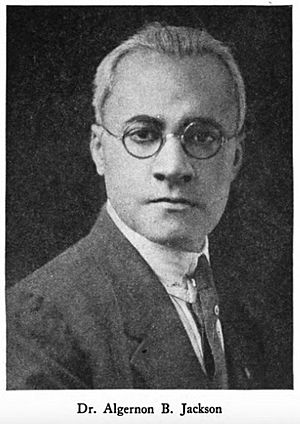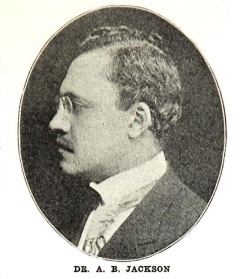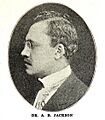Algernon B. Jackson facts for kids
Algernon Brashear Jackson was an important African American doctor, surgeon, and writer. He played a big part in the National Negro Health Movement. This group worked to help African Americans by teaching them about staying healthy and preventing sickness. He also helped start the Sigma Pi Phi fraternity and found a new way to treat rheumatism.
Contents
About His Life
Algernon B. Jackson was born in Princeton, Indiana, on May 21, 1878. His parents were Charles A. Jackson and Sarah L. (née Brashear) Jackson. His mother was a public school teacher. She studied at several universities, including Indiana University.
Algernon married Elizabeth A. Newman on June 20, 1920. They were married in Media, Pennsylvania. He passed away at his home in Washington, D.C., on October 22, 1942, when he was 64 years old.
His Career and Work
Jackson went to Indiana University for his first degree. Then he studied medicine at Jefferson Medical College in Philadelphia. He earned his medical degree (M.D.) in 1901. He also did more studies at Columbia University and the University of Pennsylvania.
After his studies, he became an assistant surgeon at Philadelphia Polyclinic Hospital. This hospital was run by white doctors. He was the first and only Black surgeon to work there at that time. He stayed in this job for thirteen years. Jackson knew many important people in the African American community. These included Booker T. Washington and Henry McKee Minton.
Starting Hospitals and Teaching
In 1907, Jackson helped start the Mercy Hospital School for Nurses. He became the main surgeon there and worked in that role for 15 years. After that, he became the hospital's Superintendent. He stayed in this job for 9 more years until 1921.
In 1921, he left Mercy Hospital to work at Howard University. He was a professor of bacteriology and public health from 1921 to 1934. He also directed the School of Public Health from 1921 to 1925. From 1926 to 1928, he was the main doctor at Howard University.
Important Discoveries and Groups
Jackson became famous in the medical world in 1911. He found that injecting magnesium sulphate was a good way to treat rheumatism.
In 1904, Jackson, Henry McKee Minton, and two other Black medical professionals started Sigma Pi Phi. This was the first Black Greek Letter organization. Their goal was to bring together other Black professionals who thought alike.
Jackson also wrote three books: Evolution and Life: A Series of Lay Sermons, The Man Next Door, and Jim and Mr. Eddy: A Dixie Motorlogue.
Helping Public Health
Jackson was very involved with the National Negro Health Movement. He worked with them from his time as a director at Howard University until he died in 1942.
The National Negro Health Movement
The movement began in 1915. Booker T. Washington started it. He wanted to bring ideas of cleanliness and health to African Americans across the country. Jackson strongly supported this idea. He was a director of the movement for many years.
Jackson was very worried about the high number of deaths among African Americans. This was especially true for those in poor areas of the South. He believed that teaching the African American community about health and hygiene was the best way to help them. He became well-known for his work with this movement. In 1930, President Hoover even asked him to be a delegate at the White House Conference on Child Health and Protection.
Traveling and Writing
Even though he was based in Philadelphia and Washington, D.C., Jackson traveled a lot through the South. He spoke at African American public schools and youth centers. He taught about hygiene and how to prevent diseases. He also visited hospitals to see how health care was for Black people.
He wrote about what he found in different journals. He asked the government and the public to improve hospitals for Southern African Americans. He called for more money, better equipment, and more skilled staff. Most importantly, he wanted more education about preventing sickness.
Jackson also wrote columns in several African American newspapers. He reported on the state of Black health in America. He often described it as disappointing. He reached many middle-class African Americans in the North through his writing. His columns gave health advice, like "Afro Health Talk" in the Baltimore Afro-American. They also shared his opinions, like "Week-End Mosaics" in the Pittsburgh Courier. All his writings focused on improving the social standing of African Americans.
His Beliefs on Health and Race
Jackson believed that helping the African American community with health would benefit everyone. He wrote that "no man... can help lift up his brother without lifting up himself." This meant that reducing illness among Black people would also help white people who came into contact with them.
He felt that Black medical leaders had a duty to help their community. He believed they needed to teach people how to stay healthy. He also wrote about how health problems were linked to unfair treatment and prejudice against African Americans. He said that "the social and economic maladjustment born of a slimy race prejudice indigenous to America" stopped everyone from having equal chances at life and health.
Images for kids




